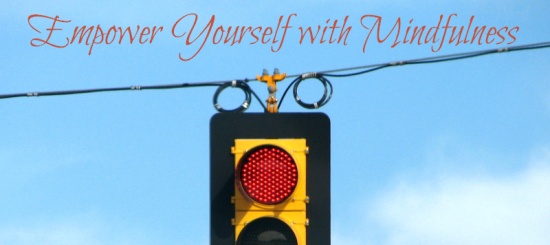My poor baby. My 3-year old must have been feeling bad. Her chosen mode of communication all day had been whining, grunting, shrieking, and that tiny little, high-pitched voice that I can’t understand. After taking her and her 6-year old sister to the pool and getting more of this communication style afterwards in the locker room, let’s just say I was not enjoying the present moment. I was annoyed.
Practicing mindfulness or meditation doesn’t mean that we don’t have uncomfortable feelings anymore. Indeed, we may become more aware of them. But we have also been practicing the remedy: awareness of all the wonderful things happening in the present moment.
Yes, sometimes, we get so wrapped up in our drama that we can’t see the good things happening. I know that happens to me more than I would like! But practicing mindfulness allows us to let go of this “brain weather” more quickly.
Over time we realize how feelings come and go like clouds in a windy sky.
So that day after the pool, my practice helped get through a patch of my own “brain weather.” I couldn’t stop or control my daughter’s actions, but I could control where I placed my attention. Waiting at a stoplight, I noticed my urge to turn on the music to distract myself from the discomfort of my irritation at her. instead, I stopped and took a breath. I used this gatha: as I breathed in, I said to myself, “I have arrived.” As I breathed out, I said to myself, “I am home.”
Ah.
It gave me just the bit of space I needed to appreciate the present again.
So here are three steps to empower you through those difficult moments using mindfulness:
Acknowledge what you are feeling. We can’t just avoid difficult feelings with ourselves or our kids. The first step is always acknowledgement: “Hello irritation. I see you there.” Or for our kids: “It looks like you are frustrated!”
Breathe into the present moment. “I have arrived, I am home” works nicely here. Take 3 breaths to pause and get centered in yourself. You CAN breathe through this.
Respond mindfully. Once you are centered and have released a bit of the feeling, you can respond from a more clear-headed, soul-centered place.
It won’t always work, but this is the best path in responding to difficult moments in a way that resonates with my values. As you try to implement this remember, as the wonderful Lori Petro from TeachThruLove tells us, “It’s about progress, not perfection.”
How do you deal with difficult moments like this? I’m grateful for all of your comments and feedback. You can leave them below or on my facebook page!
P. S. Each week I share personal insights only in email. Plus subscriber yoga practices, meditations, and more. Click here to be part of it!


